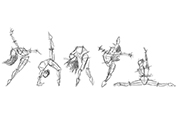Learn how to draw horses.
Large animals with complex musculature, horses have earned a reputation for being difficult to draw. But drawing a realistic horse is not impossible.
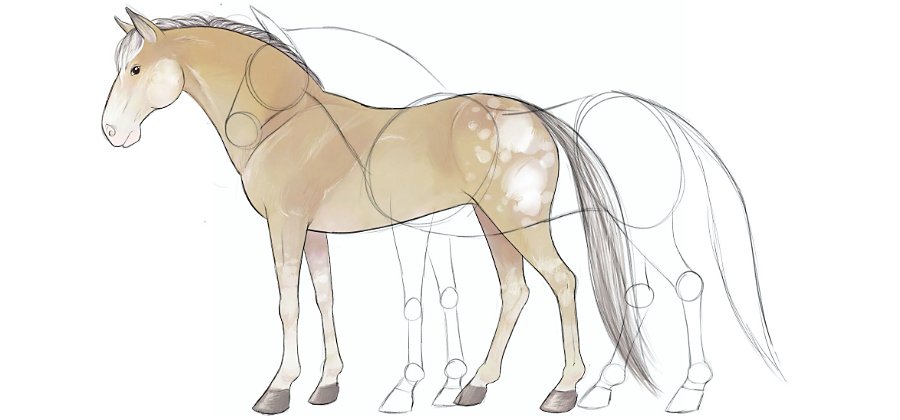
Draw everything from the horse’s head to its hind legs.
You can learn to draw a horse by employing the same methods as professional artists do: begin your sketches by using reference images and then simplifying a horse’s features into basic shapes. Taking a step-by-step approach will allow you to make the complexity of a horse more manageable. Let’s get started.
Find reference images of horses.
Horse drawing begins where drawing any new subject does: studying horses. If you can’t observe a horse in person, you’ll have to compile reference images. Reference can be simple. You can find it in books, photos or even the use of toy models. You can also explore thousands of reference images with resources like Adobe Stock.
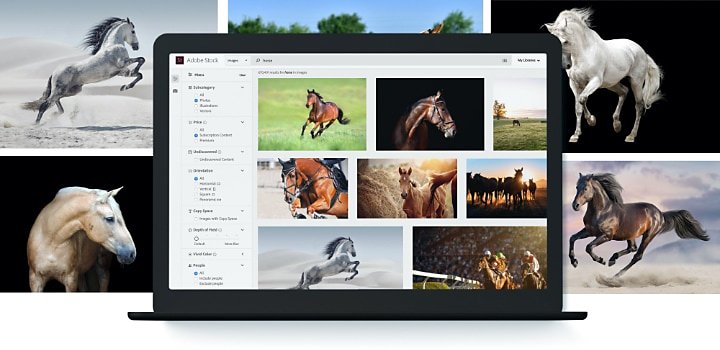
Reference is not something you trace, it’s source material you study. Studying your subject allows your mind to memorise the unique shapes of what you want to draw, from the length of a horse’s neck to the way a horse’s mane lies on the top of the head. Using reference prevents your mind from filling in inaccurate details.
Once you’ve found your reference images, you’re ready to start drawing on paper or in Adobe Fresco. If you found and clicked the heart icon on an Adobe Stock image, you can juxtapose your reference nicely with your drawing space by bringing it into a new Adobe Fresco document — easily accessible via Adobe Creative Cloud. Each photo can be imported onto your canvas and repositioned so you can study the reference as you draw.
Begin by sketching simple shapes.
In your reference, you’ll see that every horse’s body is made up of similar shapes. The sketched framework of a horse is built of circles, curved lines and the straight lines of slanted squares — like upside-down teacups. In a few simple steps, using simple shapes, you’ll have a handle on the basic structure of a horse.
Start with the horse’s body.
Draw two circles connected by sloping lines. In most horses, the top line slopes gently down toward the ground with the curve of the spine. The bottom line also curves in the same direction, filling in the rib cage and belly.
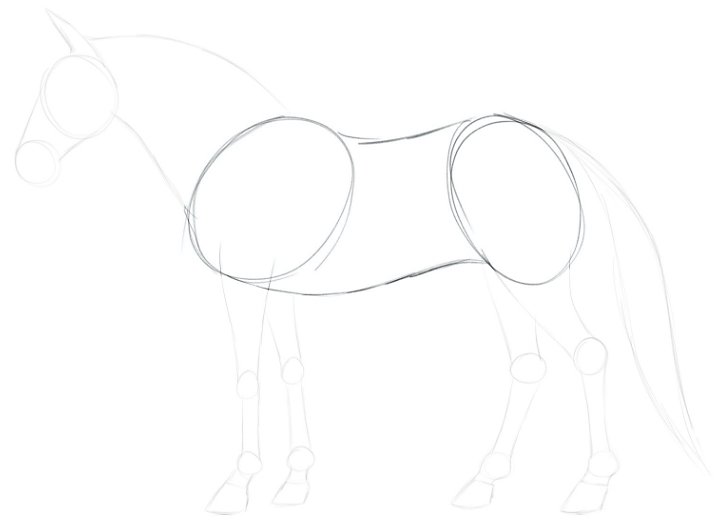
Focus on the head.
A horse’s head can be roughed out with two circles connected by a line. A gently curved triangle makes the ear. Changing the shape of the lines and distance of the circles is how you can make your horse look like a specific breed. These subtle shifts can have a huge effect on your final drawing. For instance, a larger draught horse head will have bigger circles that are closer together. A more lightweight horse, like an Arabian, will be constructed of circles that are smaller and further apart.
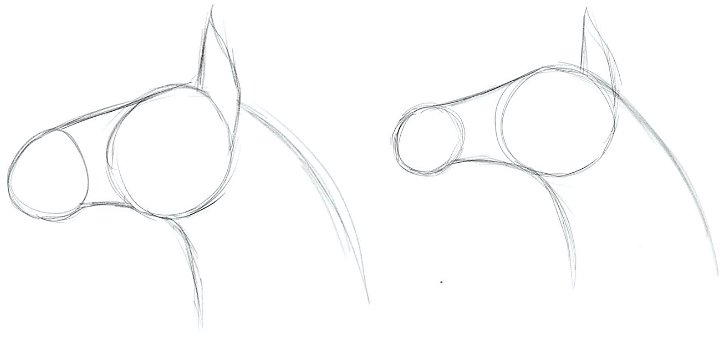
Give the horse legs.
Begin drawing both the front and the back legs with two circles connected by sloping lines, using inverted teacup shapes as the hooves. You can move the circles around as needed to bend or reposition the legs. The front legs of a horse move differently from the back legs, so pay close attention to your reference for how both sets look in motion and standing still.
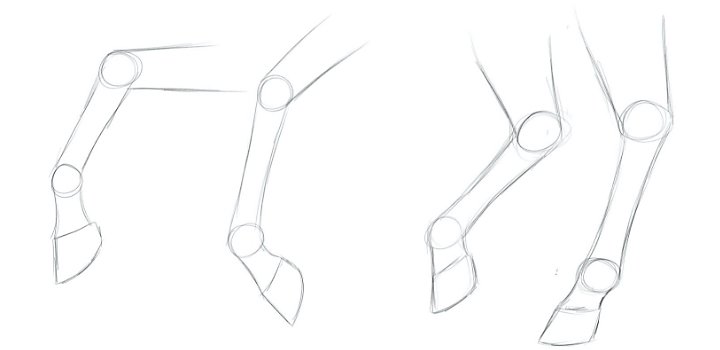
Refine your horse sketch using layers.
Once these main shapes are set, you have the basic structure of your horse. Regardless of medium, you can now begin adding detail to your base. The great benefit of digital art is it allows you to use layers to make drawing easier and faster. Layers are, in essence, invisible pieces of paper that stack on top of each other. Layers allow you to trace over your sketch and refine the horse to make it look real and can help to remove some of the tedium of using an eraser to clean up your final piece. Follow these step-by-step instructions to use layers to help finalise your horse drawing.
Adjust your layer opacity.
On the layer featuring your horse body sketch, use the Layer Properties menu to turn the opacity down to make the sketch very light. Choose any opacity level that you like, so long as you can still see the sketch and use it as a guide.
Create a new layer.
Make a new layer by hitting the + button. This new layer should appear on top of your sketch. Draw on this layer with any brush you like to refine your horse. (A pencil brush at 7 pixels in size is used in these sample images.)
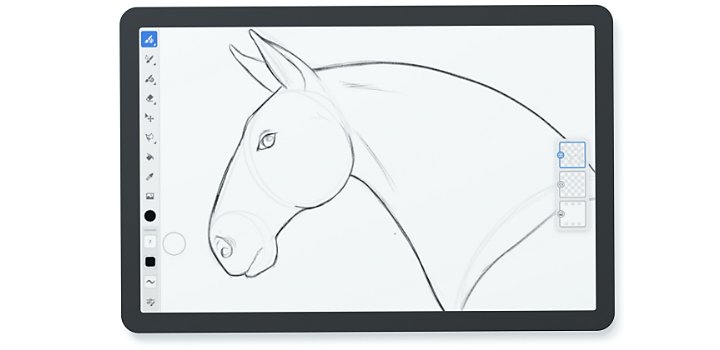
Let the reference lead you.
Study the reference photos of real horses you compiled to see where you should place items like the eyes, the nose and the mouth on the circles in your sketch’s head. The same goes for the definition and shape of the horse’s legs. Trace around your simple circle and line shapes to replicate the muscles of a horse’s legs. Continue this process for the body, the hair and the rest of the horse. If you decide part of your sketch looks off, you can diverge from your initial framework. Or, simply erase and try again — an easy adjustment when working digitally.
Add colour and detail to your horse.
When your horse is fully refined, make another new layer by hitting the + button. This new layer should be above your sketch, but below your refining layer. This will allow you to colour under your lines but above your initial sketch.
You can select different brushes when working in digital to add depth and texture to your colouring. From types of painting brushes to dry media, Adobe Fresco gives you access to many incredible brushes — explore different brushes to get the results you want. In the sample image, the base colour was done with the Soft Chalk brush and the white spots were added on separate layers using the Live Watercolour brushes.
Fur details can also be added on a new layer using the Rough Pencil brush. There’s no wrong or right way to use layers or brushes, but there are countless options and combinations to inspire your creativity.
Whether you opt to go digital or sketch in a traditional medium, anyone can draw a horse if they put in the time to practise and use reference images. The same premise holds for drawing dogs or even roses — try those challenges next.
You might also be interested in…
Take your skills to the next level with drawing exercises and advice from professional illustrators.
Get tips on how to draw this challenging bit of human anatomy.
Get an introduction to the illustration style of Japanese comics.
Exploring watercolour techniques.
Capture the flowing brush strokes and rich texture of watercolours with these tips.
